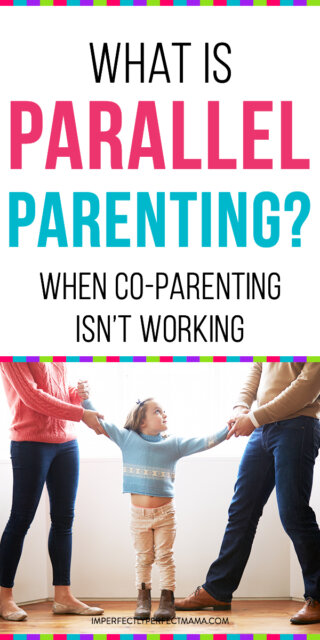I don’t have to spout statistics at you when it comes to divorce rates – we all know that divorce is highly prevalent in our culture, especially for couples with children.

Is that a terrible thing? Not necessarily, since many couples decide to divorce in order to protect their children from a negative domestic environment.
However, this doesn’t guarantee an amicable divorce where everything is hunky-dory and the sharing of parental responsibilities is accepted in a respectful and agreeable manner.
The truth is, divorce and separation come with bad feelings. Oftentimes, these bad feelings between two parents melt away as each grows accustomed to the new situation.
Sometimes, however, the animosity doesn’t naturally disappear and one (or more) parents take advantage of the co-parenting situation to carry out a sort of “revenge” against their former partner.
This sucks, especially for the little ones.
If you find yourself in this situation, there is a solution. Instead of focusing on co-parenting with a spiteful ex, you can try to parallel parent with them instead.
What is the Difference Between Co-Parenting and Parallel Parenting?
Co-parenting is a technique used by individuals parenting apart that is based on mutual respect and the desire to put the children’s needs first.
Is co-parenting always perfect? No, but that’s because no parent is perfect.
There will always be bumps and blips along the way as individuals learn how to parent apart and facilitate healthy communication and decision-making.
The basis of co-parenting is that both parents want it to work and are willing to make it work.
But what happens when your ex remains belligerent and difficult when it comes to parenting your child together?
Well, then co-parenting doesn’t work. Instead, you may have to adopt a parallel parenting style when it comes to dealing with your ex.
In a nutshell, parallel parenting involves disengaging from the other parent on a personal level as much as possible and avoiding conflict controlled communication.
Is turning cold toward your ex ideal for your child? Well, no, since you do want to model healthy relationships for your little one.
But you know what’s worse? Exposing your child to arguments, screaming matches, abuse and other forms of conflict.
By implementing parallel parenting, you are actually creating a less stressful and more harmonious environment for your child. Plus, you are teaching them healthy coping skills when it comes to dealing with conflict.
While all of this may sound good, how exactly does one parallel parent?
Here are some tips for parallel parenting with your ex:
1. Limit Communication
As I mentioned above, a huge factor of parallel parenting is limiting communication with your ex.
This means only exchanging important information about your child such as changes to visitation arrangement, medical issues, etc.
There is no need for your ex to know what is going on in your life. In fact, if they are vengeful, they may try to use that sort of information against you.
Instead, make yourself uninteresting to them. Not only does this eliminate their source of “ammunition” but it always returns the focus to your child and their well-being.
It also helps to limit communication to text or emails only. This way you are less likely to be pulled into an argument or coerced into sharing details about your life.
Oh, and block them on social media too.
2. Make Specific Arrangements
A spiteful ex may try to use vague information against you, so it’s best to ensure all agreements are specific and detailed – and in writing!
For instance, you may agree that your children can visit their other parent for two weekends per month. Unless you specify which weekends, your ex may try to take them whenever he or she feels like it.
The best way to circumvent these issues is to have a court order, even if you guys are initially in agreeance.
Having things officially printed on paper eliminates the potential for arguments over vague language or loopholes.
Plus, this makes it easier to maintain a routine for your children instead of having it constantly disrupted by changes or demands.
3. Create Boundaries
Creating boundaries isn’t always about communicating limits to the other person. You can have your own personal boundaries where you know your limits and what you are willing to take.
For example, you can have your personal rule that you don’t answer your phone after 9 pm, even if your ex calls or texts. So, don’t answer if he or she calls/texts after that time.
You need to know how much you are willing to take, for both yourself and your children.
Creating boundaries is also about knowing your legal rights and what can be done in the family court system.
If ever in doubt, speak to a lawyer about what kinds of behaviors and treatments can constitute the necessity of going to court.
Dropping the kids off an hour later every now and then is likely not going to catch the attention of the judge, but consistently dropping them off late may be an issue worth having a hearing for.
4. Don’t Give In To Arguments
This aspect of parallel parenting kind of encompasses the rest but it’s important to mention.
If your ex is spiteful and vengeful, they are going to try to pull you into arguments to prove that they are right and also to get a reaction out of you.
Some people have this weird conception that, if a person enters into an argument with them, they must care in some way.
The less you give in, the less they will try to create a conflict.
It can be hard to let go of the need to defend yourself but, in the end, you really don’t have to – at least not to your ex.
Anytime you find yourself tempted into arguing, just take a deep breath and walk away if you can. It’s not worth it.
Will It Get Better?
That depends entirely on the dynamic of the relationship you have with your ex and what kind of person they are.
He or she may need time to emotionally heal before they can begin to act like a normal human being again.
Sometimes, lashing out is a sign of hurt and the spiteful and negative behavior will decrease over time.
However, if you’re dealing with a narcissist, it’s likely never going to change.
The truth is, though, that parallel parenting in the right situation will make it better. Not perfect, but better.
If you need more help, I wrote a book about my journey with a narcissist ex-husband.
Ultimately, the goal of parallel parenting is to minimize conflict as much as possible.
Hopefully, parallel parenting will only be a temporary thing as you and your ex get your lives and emotions back on track. Once that happens, you can transition into a co-parenting situation.
If it’s not, stay the course – if nothing can change, then parallel parenting remains the best solution.




Leave a Reply